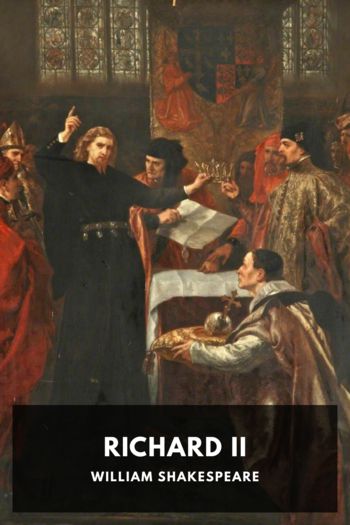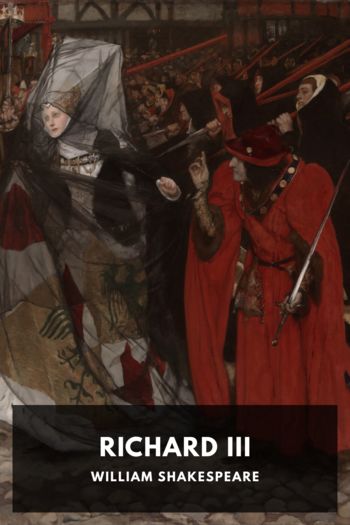Richard II by William Shakespeare (read the beginning after the end novel .TXT) 📕

- Author: William Shakespeare
Book online «Richard II by William Shakespeare (read the beginning after the end novel .TXT) 📕». Author William Shakespeare
I give this heavy weight from off my head
And this unwieldy sceptre from my hand,
The pride of kingly sway from out my heart;
With mine own tears I wash away my balm,
With mine own hands I give away my crown,
With mine own tongue deny my sacred state,
With mine own breath release all duty’s rites:
All pomp and majesty I do forswear;
My manors, rents, revenues I forego;
My acts, decrees, and statutes I deny:
God pardon all oaths that are broke to me!
God keep all vows unbroke that swear to thee!
Make me, that nothing have, with nothing grieved,
And thou with all pleased, that hast all achieved!
Long mayst thou live in Richard’s seat to sit,
And soon lie Richard in an earthy pit!
God save King Harry, unking’d Richard says,
And send him many years of sunshine days!
What more remains? Northumberland
No more, but that you read
These accusations and these grievous crimes
Committed by your person and your followers
Against the state and profit of this land;
That, by confessing them, the souls of men
May deem that you are worthily deposed.
Must I do so? and must I ravel out
My weaved-up folly? Gentle Northumberland,
If thy offences were upon record,
Would it not shame thee in so fair a troop
To read a lecture of them? If thou wouldst,
There shouldst thou find one heinous article,
Containing the deposing of a king
And cracking the strong warrant of an oath,
Mark’d with a blot, damn’d in the book of heaven:
Nay, all of you that stand and look upon,
Whilst that my wretchedness doth bait myself,
Though some of you with Pilate wash your hands
Showing an outward pity; yet you Pilates
Have here deliver’d me to my sour cross,
And water cannot wash away your sin.
Mine eyes are full of tears, I cannot see:
And yet salt water blinds them not so much
But they can see a sort of traitors here.
Nay, if I turn mine eyes upon myself,
I find myself a traitor with the rest;
For I have given here my soul’s consent
To undeck the pompous body of a king;
Made glory base and sovereignty a slave,
Proud majesty a subject, state a peasant.
No lord of thine, thou haught insulting man,
Nor no man’s lord; I have no name, no title,
No, not that name was given me at the font,
But ’tis usurp’d: alack the heavy day,
That I have worn so many winters out,
And know not now what name to call myself!
O that I were a mockery king of snow,
Standing before the sun of Bolingbroke,
To melt myself away in water-drops!
Good king, great king, and yet not greatly good,
An if my word be sterling yet in England,
Let it command a mirror hither straight,
That it may show me what a face I have,
Since it is bankrupt of his majesty.
They shall be satisfied: I’ll read enough,
When I do see the very book indeed
Where all my sins are writ, and that’s myself.
Give me the glass, and therein will I read.
No deeper wrinkles yet? hath sorrow struck
So many blows upon this face of mine,
And made no deeper wounds? O flattering glass,
Like to my followers in prosperity,
Thou dost beguile me! Was this face the face
That every day under his household roof
Did keep ten thousand men? was this the face
That, like the sun, did make beholders wink?
Was this the face that faced so many follies,
And was at last out-faced by Bolingbroke?
A brittle glory shineth in this face:
As brittle as the glory is the face; Dashes the glass against the ground.
For there it is, crack’d in a hundred shivers.
Mark, silent king, the moral of this sport,
How soon my sorrow hath destroy’d my face.
The shadow of your sorrow hath destroy’d
The shadow or your face.
Say that again.
The shadow of my sorrow! ha! let’s see:
’Tis very true, my grief lies all within;
And these external manners of laments
Are merely shadows to the unseen grief
That swells with silence in the tortured soul;
There lies the substance: and I thank thee, king,
For thy great bounty, that not only givest
Me cause to wail but teachest me the way
How to lament the cause. I’ll beg one boon,
And then be gone and trouble you no more.
Shall I obtain it?
“Fair cousin”? I am greater than a king:
For when I was a king, my flatterers
Were then but subjects; being now a subject,
I have a king here to my flatterer.
Being so great, I have no need to beg.
O, good! convey? conveyers are you all,
That rise thus nimbly by a true king’s fall. Exeunt King Richard, some Lords, and a Guard.
On Wednesday next we solemnly set down
Our coronation: lords, prepare yourselves. Exeunt all except the Bishop of Carlisle, the Abbot of Westminster, and Aumerle.
The woe’s to come; the children yet unborn.
Shall feel this day as sharp to them as thorn.
You holy clergymen, is there no plot
To rid the realm of this pernicious blot?
My lord,
Before I freely speak my mind herein,
You shall not only take the sacrament
To bury mine intents, but also to effect
Whatever I shall happen to devise.
I see your brows are full of discontent,
Your hearts of sorrow and your eyes of tears:
Come home with me to supper; and I’ll lay
A plot shall show us all a merry day. Exeunt.
London. A street leading to the Tower.





Comments (0)